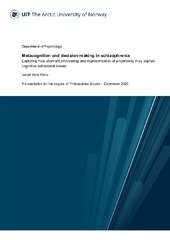| dc.contributor.advisor | Pfuhl, Gerit | |
| dc.contributor.author | Kreis, Isabel Viola | |
| dc.date.accessioned | 2021-03-16T10:00:10Z | |
| dc.date.available | 2021-03-16T10:00:10Z | |
| dc.date.issued | 2021-04-13 | |
| dc.description.abstract | The cognitive profile associated with schizophrenia has long been a research subject of interest. A plethora of studies have not only revealed cognitive deficits but also cognitive biases, meaning qualitative deviations in the way information is processed and evaluated. Such biases are for example reflected in findings of diminished metacognitive accuracy, or premature and disadvantageous decision-making. Interestingly, though often studied separately from one another, many of these biases may arise from similar underlying mechanistic aberrancies related to the processing and representation of uncertainty.
This thesis aimed to explore this overarching role of uncertainty with a particular focus on metacognitive processes and decision-making in schizophrenia. Cognitive-behavioral assessments were conducted using computerized tasks, complemented with pupillometric measures and cognitive modelling techniques. In Paper I, the relationship between decision-making under uncertainty and metacognitive accuracy was investigated. In paper II, decision-making under different kinds of uncertainty was examined, while pupil size was recorded as an indicator of norepinephrinergic activity, a postulated neurochemical marker of uncertainty. In paper III, self-reported and objectively assessed effort were inspected as knowledge- and regulation-based components of metacognition. Across all studies, the uncertainty-related measures of cognitive-behavioral performance were surprisingly similar between individuals with schizophrenia and the respective control group. However, subtle differences emerged within subgroups and on cognitive model-based estimates of uncertainty representation. Furthermore, pupillometric measures revealed significant differences in the way individuals with schizophrenia process relevant information, pointing towards diminished effort allocation and decreased tracking of uncertainty-dependent informational salience. The findings are discussed within a wider framework regarding the potentially central role of uncertainty for various clinical and cognitive-behavioral symptoms of schizophrenia. | en_US |
| dc.description.doctoraltype | ph.d. | en_US |
| dc.description.popularabstract | Individuals with schizophrenia often display unconventional thinking patterns and tend to make disadvantageous decisions. This may be due to differences in how they process and evaluate information, particularly when this information is uncertain. In this thesis, this role of uncertainty for thinking biases in schizophrenia was explored, using a range of different tasks, analysis techniques and measures of pupil size. The results showed a surprising amount of spared functioning in patients but revealed in part increased uncertainty regarding their own beliefs and choices. Such uncertainty-related processes may in turn explain the emergence of the psychotic symptoms typically associated with this disorder, i.e. delusions and hallucinations. Thus, the findings provide important new insights regarding the potential role of uncertainty for various symptoms in schizophrenia. | en_US |
| dc.description.sponsorship | This project was funded by the The Research Council of Norway with a grant awarded to main supervisor Gerit Pfuhl (FRIMEDBIO 262338), and a personal overseas research grant awarded to PhD candidate Isabel Kreis (Project No. 297347). | en_US |
| dc.identifier.uri | https://hdl.handle.net/10037/20694 | |
| dc.language.iso | eng | en_US |
| dc.publisher | UiT The Arctic University of Norway | en_US |
| dc.publisher | UiT Norges arktiske universitet | en_US |
| dc.relation.haspart | <p>Paper I: Kreis, I., Biegler, R., Tjelmeland, H., Mittner, M., Reitan, S.K. & Pfuhl, G. Overestimation of volatility in schizophrenia and autism? A comparative study using a probabilistic reasoning task. (Accepted manuscript). Now published in <i>PLoS ONE, 16</i>(1), 2021, e0244975. Available in Munin at <a href=https://hdl.handle.net/10037/20287>https://hdl.handle.net/10037/20287</a>.
<p>Paper II: Kreis, I., Zhang, L., Moritz, S. & Pfuhl, G. Spared performance but increased uncertainty in schizophrenia: evidence from a probabilistic decision-making task. (Submitted manuscript). Preprint also available at <a href=https://doi.org/10.31219/osf.io/qaupb> https://doi.org/10.31219/osf.io/qaupb</a>.
<p>Paper III: Kreis, I., Moritz, S. & Pfuhl, G. (2020). Objective versus subjective effort in schizophrenia. <i>Frontiers in Psychology, 11</i>, 1469. Also available in Munin at <a href=https://hdl.handle.net/10037/18929> https://hdl.handle.net/10037/18929</a>. | en_US |
| dc.relation.projectID | info:eu-repo/grantAgreement/RCN/FRIMEDBIO/262338/Norway/Too precise or too imprecise: which parameter is gone awry in autism and psychosis// | en_US |
| dc.rights.accessRights | openAccess | en_US |
| dc.rights.holder | Copyright 2021 The Author(s) | |
| dc.rights.uri | https://creativecommons.org/licenses/by-nc-sa/4.0 | en_US |
| dc.rights | Attribution-NonCommercial-ShareAlike 4.0 International (CC BY-NC-SA 4.0) | en_US |
| dc.subject | VDP::Social science: 200::Psychology: 260::Cognitive psychology: 267 | en_US |
| dc.subject | VDP::Samfunnsvitenskap: 200::Psykologi: 260::Kognitiv psykologi: 267 | en_US |
| dc.subject | VDP::Social science: 200::Psychology: 260::Clinical psychology: 262 | en_US |
| dc.subject | VDP::Samfunnsvitenskap: 200::Psykologi: 260::Klinisk psykologi: 262 | en_US |
| dc.title | Metacognition and decision-making in schizophrenia: Exploring how aberrant processing and representation of uncertainty may explain cognitive-behavioral biases | en_US |
| dc.type | Doctoral thesis | en_US |
| dc.type | Doktorgradsavhandling | en_US |


 English
English norsk
norsk
